
Cultural base at Gallery Školska 28
In the communication space of Gallery Školská 28, Prague 1, a temporary cultural base will be established from September 7 to September 25, 2016, in coordination with Mojmír Pukl and with the kind favor of the Unique Svatopěstitelské družstvo. The opening will take place on Tuesday, September 6, 2016, at 6:00 PM.
September 13
Bennewitz Quartet
Music of persecuted composers
(start - 7:30 PM) admission: 80 / 60 CZK
cultural base - music of silenced authors - worlds of thought
Erwin Schulhoff: Five Pieces for String Quartet
Viktor Ullmann: String Quartet No. 3
Erwin Schulhoff (1849 - 1942 Würzburg) The composer's enthusiasm for grotesque aspects, satire, and particularly dada comes to the fore in his smaller works. Schulhoff composes to texts of dadaist lyrics by Jean Arp * the cycle of songs Die Wolkenpumpe for baritone, four winds, and percussion (1922). For the piece Bassnachtigall, three pieces for counterindication for bassoon also from 1922, the composer added his own text in a provocative form, as was customary at the notoriously chaotic Dada concerts: "The divine spark may be present in the contrabassoon, just as in a sausage." !
Viktor Ullmann (1898 - 1944 Auschwitz-Birkenau) from his work: the opera The Fall of the Antichrist is a multilayered, synesthetic, apocalyptic vision of the Regent's rule, who claims to rid humanity of dependence on nature and divine forces. The Regent (a precursor of Hitler) imprisons the Technician, the Artist, and the Priest. The Technician succumbs to his seductions and constructs a spaceship meant to harness the power of the sun; the Priest begins to work on a new cult to synthesize bread from stone, while the Artist is to celebrate the Regent's work and eternal "peace." However, the Artist experiences a ritual initiation in the dungeon through the suffering of the body, uniting the microcosm and the macrocosm, pronounces the occult I ch bin and sees through the essence of the tyrant! Science + Religion + Art (Anthroposophy) depart as brothers. They are protagonists of the anthroposophical conviction that a spiritual life – and art can be set up as the only salvation and counterweight to the destructive, life-threatening forces of machine beings (Machinenwesens).
The anthroposophical Gesamtkunstwerk reached its peak in Ullmann's “Bühnenweihefestspiel” alongside the Prague Jewish-German musical creation of the first half of the 20th century. The first performance (in the original wording) 2014 directed by Jan Antonín Pitínský, set design by Tomáš Rusín
September 15
Jan Klusák and Libor Pešek
(start - 7:30 PM)
cultural base – Interview of actors from the 60s, the era, and worlds of thought
Jan Klusák (1934) studied composition at the Prague HAMU under J Řídký and P Bořkovec. A composer of operas, orchestral works, and extensive chamber music, author of music for nearly a hundred films, he worked, among others, at the Theatre of Jára Cimrman, and also acted in the films of the Czechoslovak New Wave, particularly those of J Němec and V Chytilová. He was one of the first in our country (bravely) to react to the poetics-methodology of so-called New Music, dodecaphony, serialism, Darmstadt, and the Międzynarodowego Festiwalu Muzyki Współczesnej “Warsaw Autumn” and other attitudes and procedures that were then unacceptable to the ideology and prevented by normalization. After the Velvet Revolution, he continues to create and is publicly active, receiving a medal from the president. Among the first in our country, he reacted to the poetics of so-called New Music.
Libor Pešek (1933) played the trombone in his Jazz Orchestra during his high school years. He studied conducting under Ančerl, Smetáček, and Neumann at HAMU in Prague. In 1958, he founded the Chamber Harmony, and from 1965 to 1969 he founded and directed the chamber ensemble Sebastian, premiering works by young contemporary Czech composers. He also performed successfully abroad, guesting with various orchestras.
His decade-long tenure (1987-1997) as artistic director and chief conductor of the Royal Liverpool Philharmonic Orchestra was significant. He now regularly works with leading Czech orchestras and performs abroad. In 1996, during a visit by British Queen Elizabeth II, he received the Order of the British Empire and later also a medal from President Václav Havel.
September 17
Live Differently
(start - 11:00 AM to 8:00 PM)
cultural base - open to all open-minded
"..live differently" all-day seminar exercises with various participants and debaters will be concluded (with a sound ritual) by an Aleatoric seminar conducted by the great Magi: Radomil Uhlíř and jiruCha-Cadima pertaining to good and evil-Volnící, with possible conducting of a p u t o v n í exhibition of friendly expositions in Lucern, Café "obrazyRU" at Špálova Gallery “PeNikl -P” and cultural activities according to circumstances (gown parade with cloaks and banners desirable) communicative community dealings will be offered: Production of "sharedBenches" akin to beer Set blushing for "free Siting"... Creation of garlands with recycling little embellishments Cultural Public Space Claiming the City as a form of disobedience
personally reaching out to willing volunteers cooperating initiative is open!
September 19
Pavel Zlámal (solo)
Miroslav Tóth & Rafal Mazur duo free improvisation
(start - 7:30 PM)
Pavel Zlámal (*1980) Czech clarinetist, saxophonist, composer, a graduate of JAMU, experimenter, and avant-gardist. Leads authorial ensembles - Next Phase, Brno Improvising Unit, the orchestra of guided improvisations Divergent Connections Orchestra, or Heterofón.
Slovak-Polish duo Miroslava Tótha and Rafala Mazura will present a version of radical free jazz.
Miro Tóth is a Slovak composer, saxophonist, and vocalist specializing in musical audiovisual performances. He was at the birth of the improvisational orchestra Frutti di Mare, which creates in real-time according to a graphic score with improvisational VJing.
Rafal Mazur is a Polish musician playing a special acoustic guitar built according to his specifications. He has developed his own approach to guitar playing and improvisation as such - intertwining sounds, gestures, and extended techniques.
September 22
Interview
(start - 7:30 PM)
cultural base - Live radio interview with a contemporary artist about current art and society.
concept and direction: Janek Rous
We are born with a personal understanding of the world. However, from a young age, we are exposed to the brutal violence of upbringing. We resist, we become neurotic. We either give up or endure.
September 25
Petr Rezek: Beuys and the Floor in Bochum
(start - 7:30 PM)
cultural base
The Czech phenomenological philosopher, aesthetician, and art theorist will present a fundamental contribution.
Petr Rezek addresses, among other things, philosophical questions of psychology, the history of philosophy, ancient philosophy, the work of Jan Patočka, theory of art and architecture, and aesthetics. Since 2004, his selected earlier and entirely original texts have been published in a uniform graphic design by the publishing house Ztichlá klika under the title Collected Works, where the book Slipping, or death, considering his lifetime work, for which he received the F. X. Šalda Award in 2015. On May 17, 2010, he received the Tom Stoppard Award for the book Architectonics and protoarchitecture. He works at the Faculty of Humanities at Charles University and teaches philosophy of art at the Academy of Fine Arts in Prague.
June 23 – September 25
Maybe an Ellipse: Milan Guštar
exhibition - white wall (closing - Sunday, September 25, at 6:00 PM)
Interactive generative kinetic intermediate site-specific installation.
The communication space Školská 28 is open Tuesday–Friday from 1 PM to 6 PM (on Tuesday until 7 PM) and further according to the program.
More information >
September 13
Bennewitz Quartet
Music of persecuted composers
(start - 7:30 PM) admission: 80 / 60 CZK
cultural base - music of silenced authors - worlds of thought
Erwin Schulhoff: Five Pieces for String Quartet
Viktor Ullmann: String Quartet No. 3
Erwin Schulhoff (1849 - 1942 Würzburg) The composer's enthusiasm for grotesque aspects, satire, and particularly dada comes to the fore in his smaller works. Schulhoff composes to texts of dadaist lyrics by Jean Arp * the cycle of songs Die Wolkenpumpe for baritone, four winds, and percussion (1922). For the piece Bassnachtigall, three pieces for counterindication for bassoon also from 1922, the composer added his own text in a provocative form, as was customary at the notoriously chaotic Dada concerts: "The divine spark may be present in the contrabassoon, just as in a sausage." !
Viktor Ullmann (1898 - 1944 Auschwitz-Birkenau) from his work: the opera The Fall of the Antichrist is a multilayered, synesthetic, apocalyptic vision of the Regent's rule, who claims to rid humanity of dependence on nature and divine forces. The Regent (a precursor of Hitler) imprisons the Technician, the Artist, and the Priest. The Technician succumbs to his seductions and constructs a spaceship meant to harness the power of the sun; the Priest begins to work on a new cult to synthesize bread from stone, while the Artist is to celebrate the Regent's work and eternal "peace." However, the Artist experiences a ritual initiation in the dungeon through the suffering of the body, uniting the microcosm and the macrocosm, pronounces the occult I ch bin and sees through the essence of the tyrant! Science + Religion + Art (Anthroposophy) depart as brothers. They are protagonists of the anthroposophical conviction that a spiritual life – and art can be set up as the only salvation and counterweight to the destructive, life-threatening forces of machine beings (Machinenwesens).
The anthroposophical Gesamtkunstwerk reached its peak in Ullmann's “Bühnenweihefestspiel” alongside the Prague Jewish-German musical creation of the first half of the 20th century. The first performance (in the original wording) 2014 directed by Jan Antonín Pitínský, set design by Tomáš Rusín
September 15
Jan Klusák and Libor Pešek
(start - 7:30 PM)
cultural base – Interview of actors from the 60s, the era, and worlds of thought
Jan Klusák (1934) studied composition at the Prague HAMU under J Řídký and P Bořkovec. A composer of operas, orchestral works, and extensive chamber music, author of music for nearly a hundred films, he worked, among others, at the Theatre of Jára Cimrman, and also acted in the films of the Czechoslovak New Wave, particularly those of J Němec and V Chytilová. He was one of the first in our country (bravely) to react to the poetics-methodology of so-called New Music, dodecaphony, serialism, Darmstadt, and the Międzynarodowego Festiwalu Muzyki Współczesnej “Warsaw Autumn” and other attitudes and procedures that were then unacceptable to the ideology and prevented by normalization. After the Velvet Revolution, he continues to create and is publicly active, receiving a medal from the president. Among the first in our country, he reacted to the poetics of so-called New Music.
Libor Pešek (1933) played the trombone in his Jazz Orchestra during his high school years. He studied conducting under Ančerl, Smetáček, and Neumann at HAMU in Prague. In 1958, he founded the Chamber Harmony, and from 1965 to 1969 he founded and directed the chamber ensemble Sebastian, premiering works by young contemporary Czech composers. He also performed successfully abroad, guesting with various orchestras.
His decade-long tenure (1987-1997) as artistic director and chief conductor of the Royal Liverpool Philharmonic Orchestra was significant. He now regularly works with leading Czech orchestras and performs abroad. In 1996, during a visit by British Queen Elizabeth II, he received the Order of the British Empire and later also a medal from President Václav Havel.
September 17
Live Differently
(start - 11:00 AM to 8:00 PM)
cultural base - open to all open-minded
"..live differently" all-day seminar exercises with various participants and debaters will be concluded (with a sound ritual) by an Aleatoric seminar conducted by the great Magi: Radomil Uhlíř and jiruCha-Cadima pertaining to good and evil-Volnící, with possible conducting of a p u t o v n í exhibition of friendly expositions in Lucern, Café "obrazyRU" at Špálova Gallery “PeNikl -P” and cultural activities according to circumstances (gown parade with cloaks and banners desirable) communicative community dealings will be offered: Production of "sharedBenches" akin to beer Set blushing for "free Siting"... Creation of garlands with recycling little embellishments Cultural Public Space Claiming the City as a form of disobedience
personally reaching out to willing volunteers cooperating initiative is open!
September 19
Pavel Zlámal (solo)
Miroslav Tóth & Rafal Mazur duo free improvisation
(start - 7:30 PM)
Pavel Zlámal (*1980) Czech clarinetist, saxophonist, composer, a graduate of JAMU, experimenter, and avant-gardist. Leads authorial ensembles - Next Phase, Brno Improvising Unit, the orchestra of guided improvisations Divergent Connections Orchestra, or Heterofón.
Slovak-Polish duo Miroslava Tótha and Rafala Mazura will present a version of radical free jazz.
Miro Tóth is a Slovak composer, saxophonist, and vocalist specializing in musical audiovisual performances. He was at the birth of the improvisational orchestra Frutti di Mare, which creates in real-time according to a graphic score with improvisational VJing.
Rafal Mazur is a Polish musician playing a special acoustic guitar built according to his specifications. He has developed his own approach to guitar playing and improvisation as such - intertwining sounds, gestures, and extended techniques.
September 22
Interview
(start - 7:30 PM)
cultural base - Live radio interview with a contemporary artist about current art and society.
concept and direction: Janek Rous
We are born with a personal understanding of the world. However, from a young age, we are exposed to the brutal violence of upbringing. We resist, we become neurotic. We either give up or endure.
September 25
Petr Rezek: Beuys and the Floor in Bochum
(start - 7:30 PM)
cultural base
The Czech phenomenological philosopher, aesthetician, and art theorist will present a fundamental contribution.
Petr Rezek addresses, among other things, philosophical questions of psychology, the history of philosophy, ancient philosophy, the work of Jan Patočka, theory of art and architecture, and aesthetics. Since 2004, his selected earlier and entirely original texts have been published in a uniform graphic design by the publishing house Ztichlá klika under the title Collected Works, where the book Slipping, or death, considering his lifetime work, for which he received the F. X. Šalda Award in 2015. On May 17, 2010, he received the Tom Stoppard Award for the book Architectonics and protoarchitecture. He works at the Faculty of Humanities at Charles University and teaches philosophy of art at the Academy of Fine Arts in Prague.
June 23 – September 25
Maybe an Ellipse: Milan Guštar
exhibition - white wall (closing - Sunday, September 25, at 6:00 PM)
Interactive generative kinetic intermediate site-specific installation.
The communication space Školská 28 is open Tuesday–Friday from 1 PM to 6 PM (on Tuesday until 7 PM) and further according to the program.
More information >
The English translation is powered by AI tool. Switch to Czech to view the original text source.

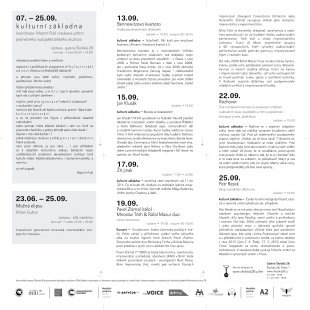
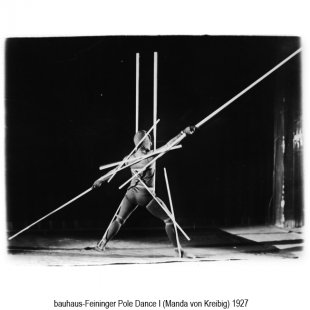
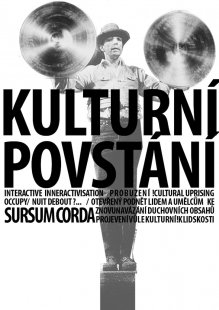
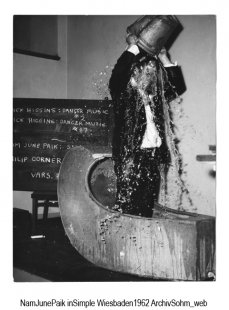
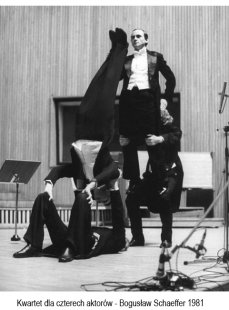
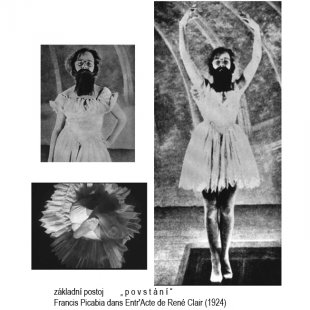
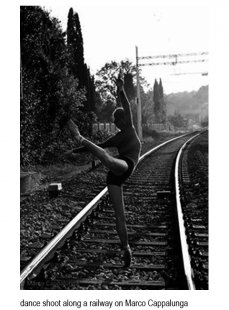
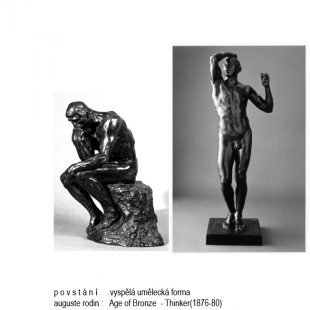
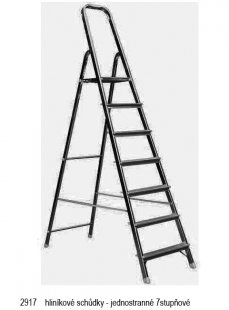
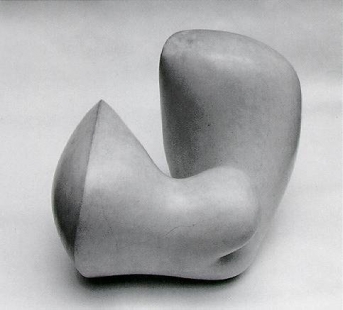
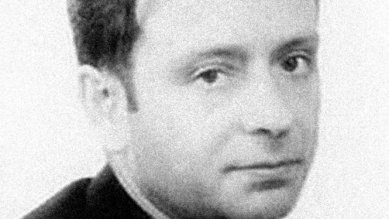
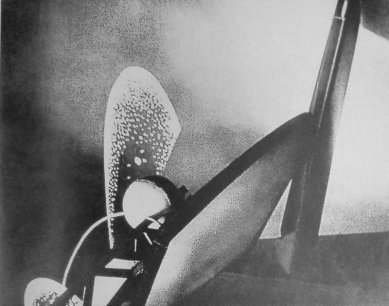
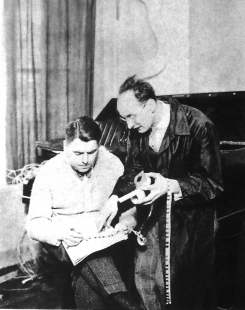
0 comments
add comment










